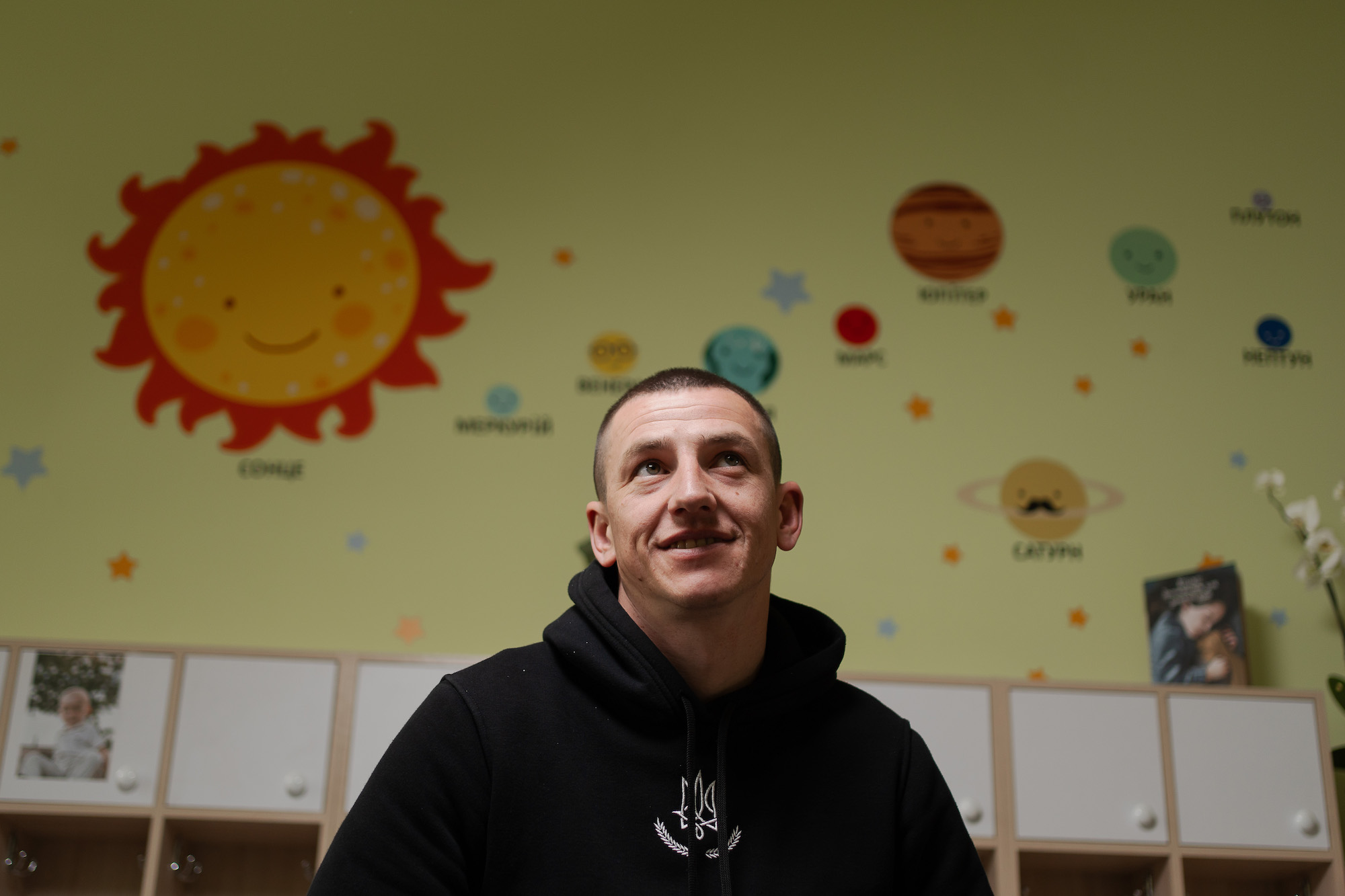
Let’s run, mom
Three-year-old Marko and ten-year-old Dmytro often go with their mother to training, filming and performances. For seven years, Olha has been involved in initiatives related to rehabilitation and supporting both veterans and civilians with amputations. You might have seen her on a billboard where a beautiful young woman in uniform with a prosthesis is holding her young son above her head.
Having realized that she can cope and live fully, Olia has decided to show others that anything is possible.
On you
The enemy started zeroing in on their positions near Avdiivka on Saturday evening. Olha, a soldier and a senior cook of the battalion, was sitting on a chair, and drinking her coffee in the summer kitchen, where she had just finished cooking dinner for her comrades.
Their battle positions are a bit ahead, in the abandoned houses of those who fled from the war, as the front had already reached their gates, The soldiers holding this front lived in this surrounding void.
There is only a wall between Olia and the fresh field in May. At first, the falling of shells is barely heard. Suddenly, it got closer, although still not so close. The clay from the kitchen’s walls scatter on a red-faced, freckled girl.
“They’ve already zeroed in on a target, they’ll hit the mark somewhere soon,” one of the guys will say. They will hit the mark at six the next morning − May 14, 2017.
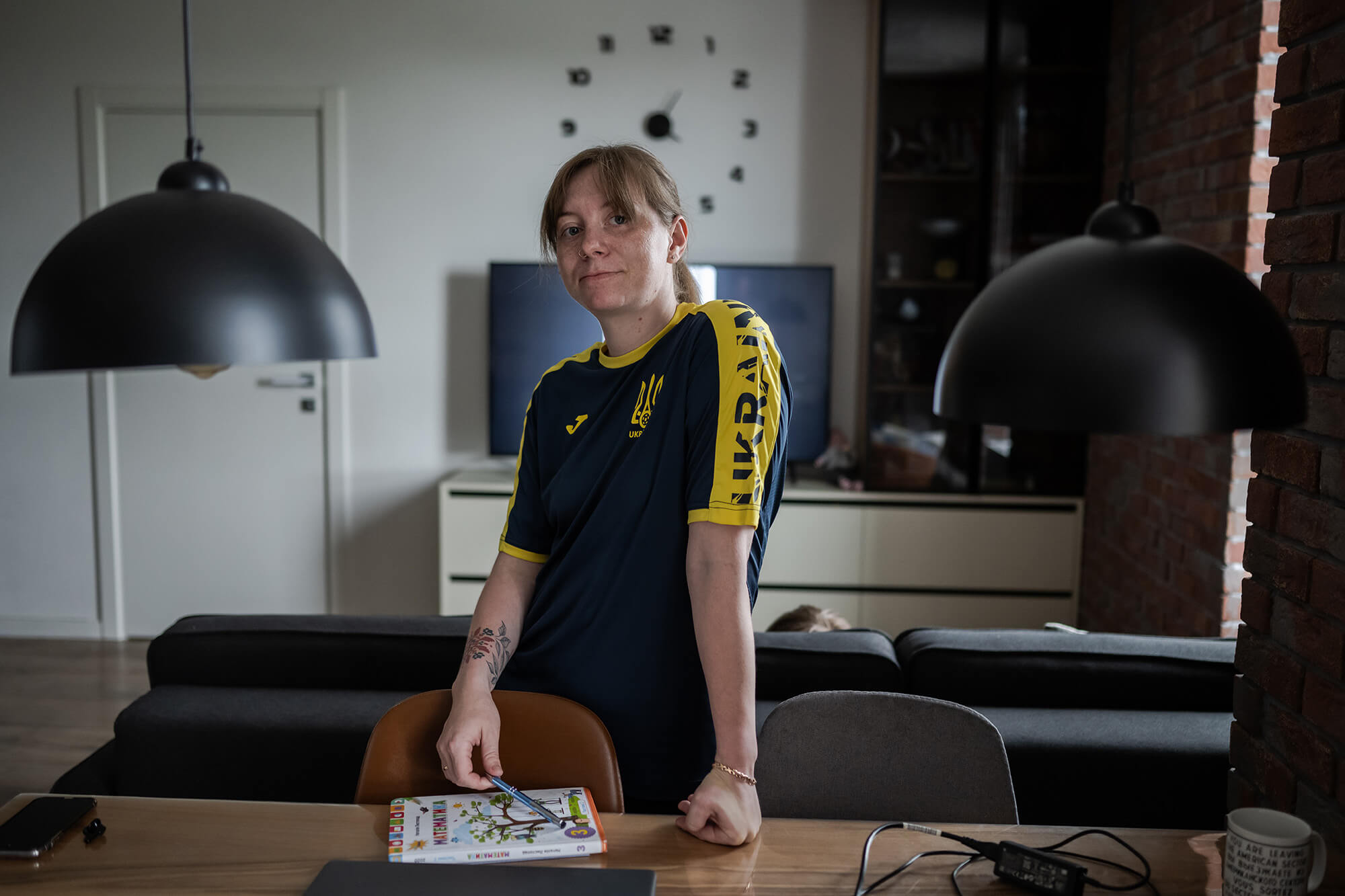
Still half-asleep, Olia felt like she had overslept and hadn’t cooked breakfast for the guys, so someone hit her jokingly with a pillow.
Upon opening her eyes, she realized she was on the floor. The bed was situated in another corner of the room, and there was a huge hole where the window had been. Somewhere, she could hear water leaking, probably from the battery. It was black, dusty, stuffy. Her right leg was beneath her, and her left leg was stretched out in front. She began calling for help, and a moment later, she heard another shot.
Olia doesn’t know how to explain the comprehension that the shell is flying towards her and will hit her. Maybe this one seems to be flying slower than it really is. She falls to the floor, trying to get as close to the ground as possible, doing everything right. Through the hole where the window used to be, she sees a shell. It’s already here, slowly digging in, and the earth explodes with blackness. Olha covers her face with her hands—she is almost fully on the ground.
On you
Since childhood, Olha Benda has been good at running short distances.
In the first grade, she broke her leg. The fracture had been severe, and although the bone healed the leg still hurt. She had difficulty walking, often limped and twisted her foot. It was then that Olia ran for the first time. She sped up and realized how easy it was for her to run. The pain went away, and her legs felt fast. In this way, she “ran” through the entire school and the entire vocational school. Maybe, she thought, this time she would need to do the same thing. But first she would have to learn to walk again.
At first, she even felt sorry for herself, thinking that she wasn’t managing very well.After all, she’s only 24 years old, and losing a leg isn’t easy. She thought this until an amputee said, “Oh, you walk badly.” It struck a nerve in Olha—she decided to learn to do it well, no matter what. Now Olia is 32 years old, and when she walks, her walk is wonderful.
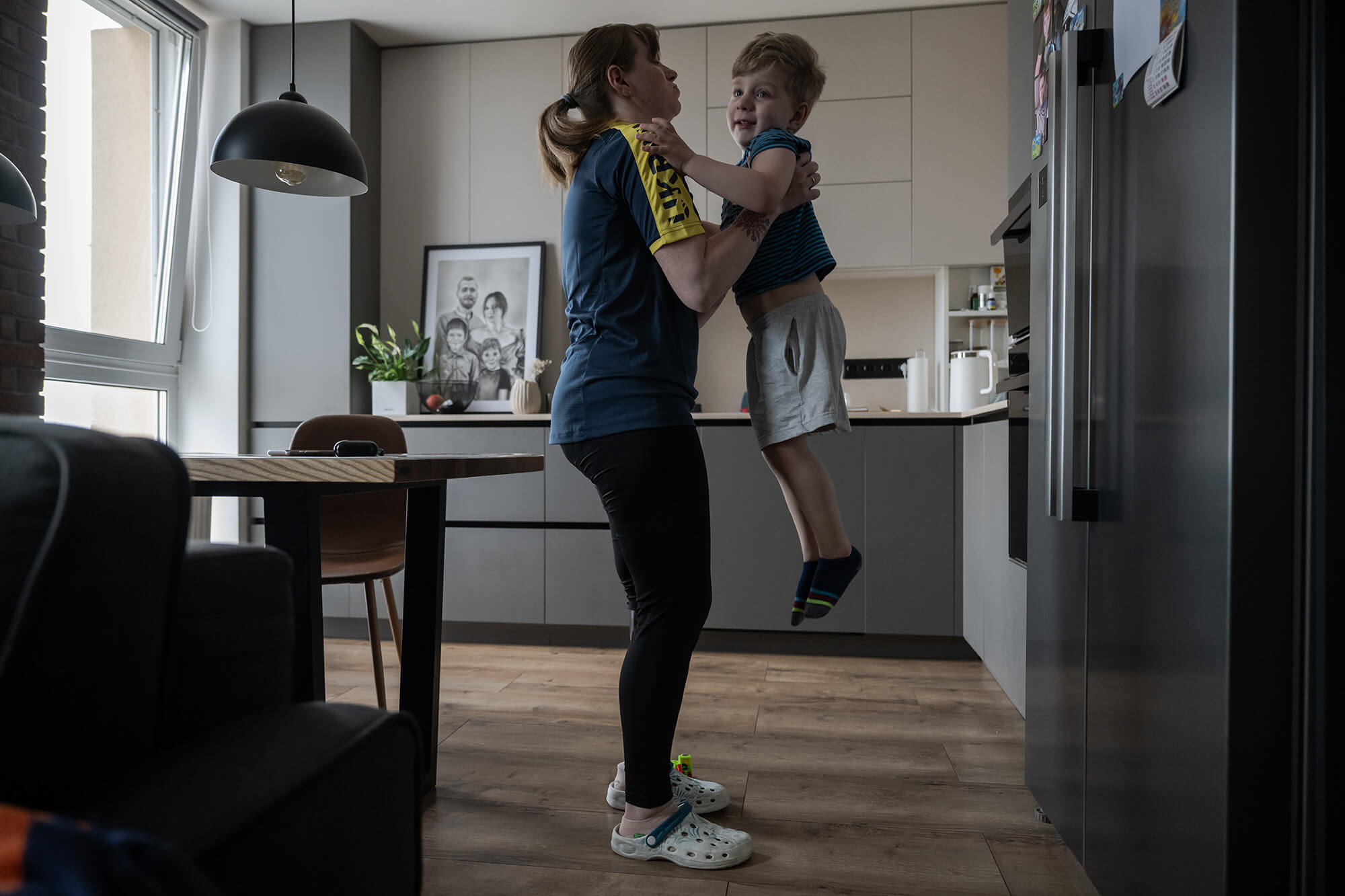
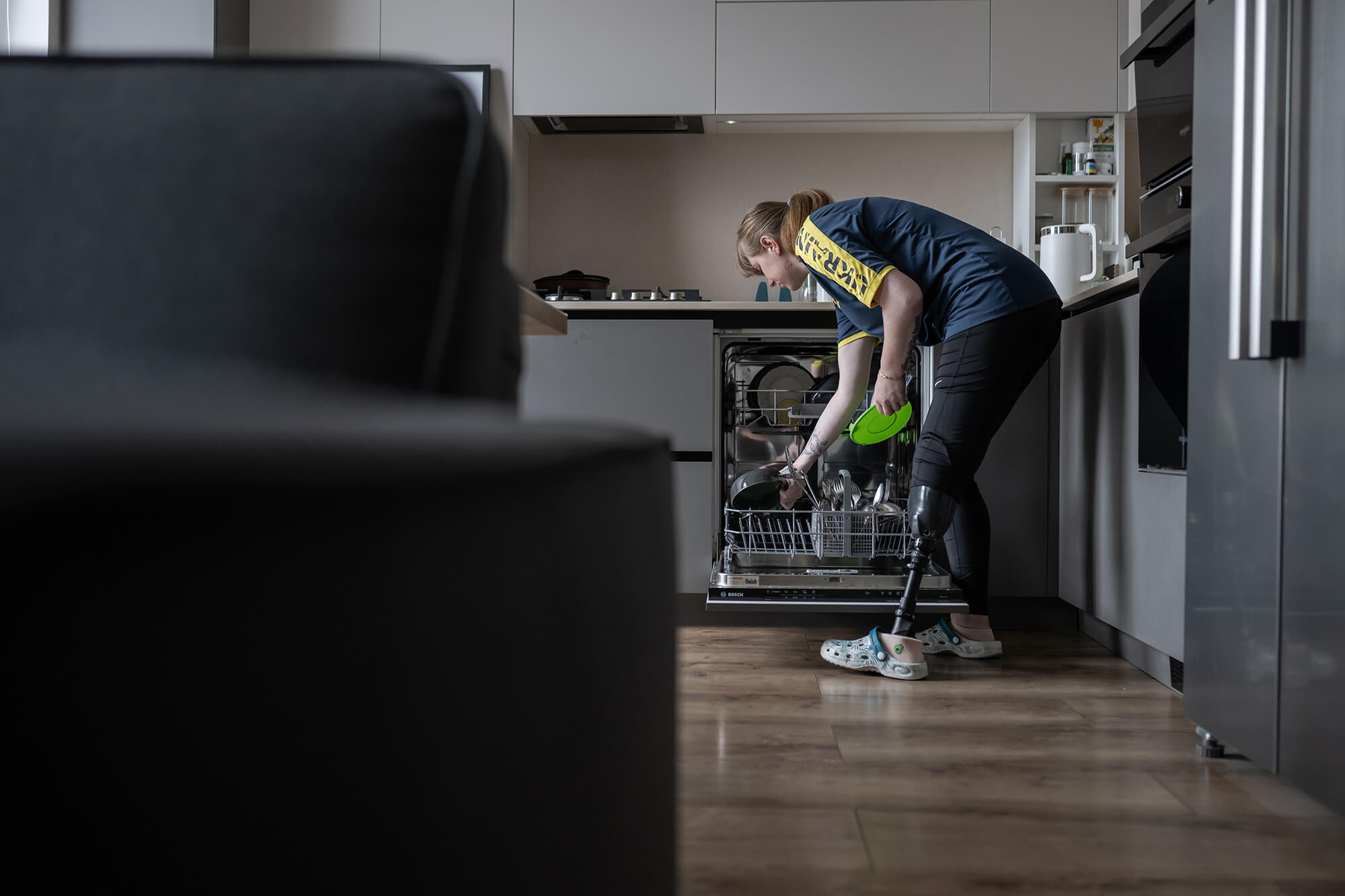
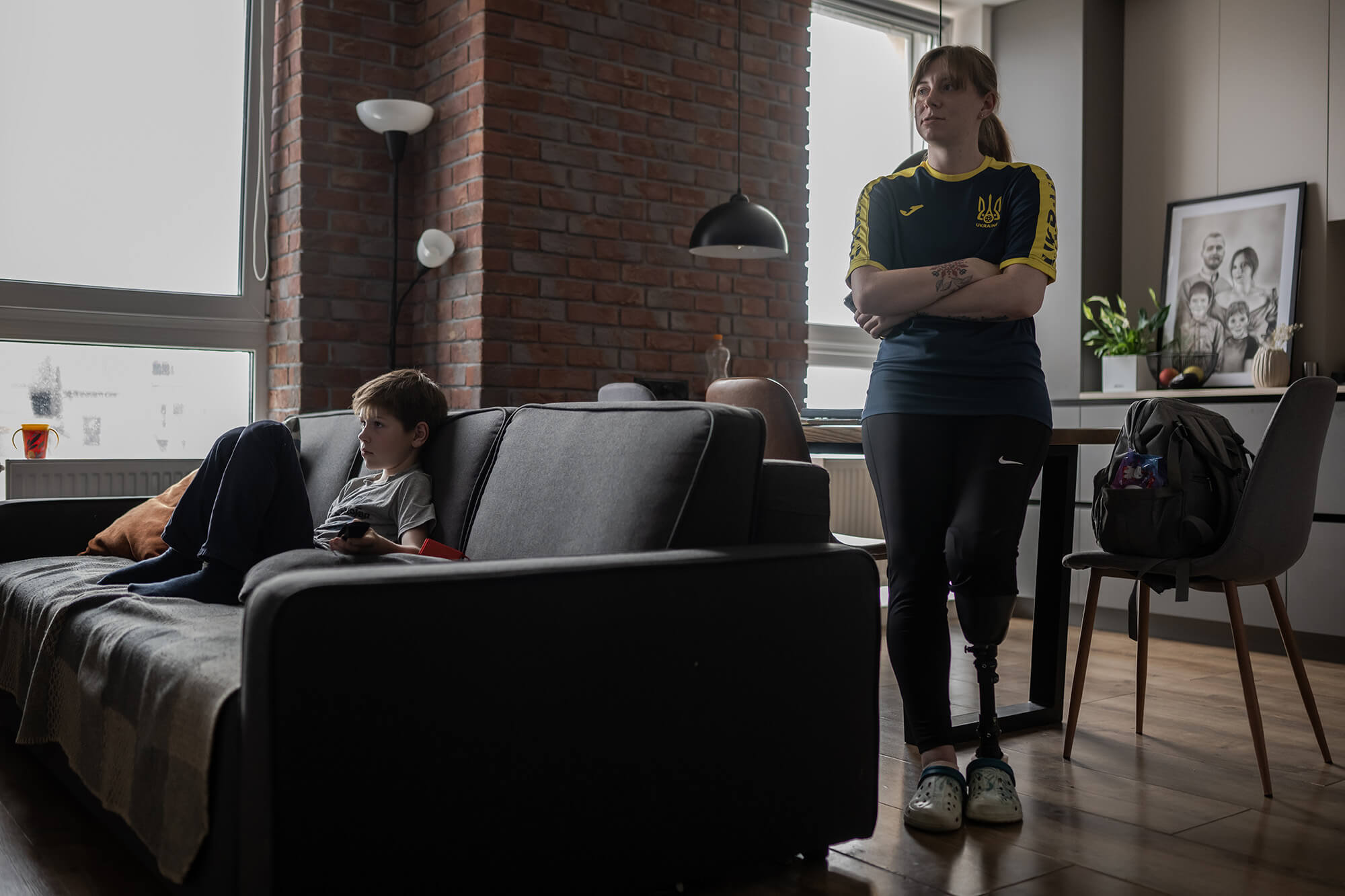
When Olia was offered rehabilitation through running, she thought it was more than just a coincidence.
It started with half a minute in the corridor of the Kharkiv rehabilitation center. Then three minutes. Then ten. Twice a week she ran at Olimpiyskiy in Kyiv, on weekends, near her house in Bilohorodka.
In her youth, Olia had been a sprinter, but now she had to run marathons. The first was “Veteran Dozen” in the capital. She ran the first five hundred meters in pain, holding the assistant’s hand, and even thought that she would not finish. “I had two hours for ten kilometers and covered them in one hour and thirty-five minutes.” And soon, she ran the Marine Corps marathon in the United States, breaking her own record for ten kilometers in the process.She was the only woman with a prosthesis among forty thousand participants.
“Running with a prosthesis is even easier than on two legs. In fact, it takes more concentration to control the balance. When I was given my first prosthesis, I decided to do everything! Nothing is impossible. And if there is, I still have to try.”
Combinations of legs
Olha lives on the sixth floor of an apartment building in Bilohorodka. It is so close to the capital that the capital’s TV tower can be seen from her windows. Twice a week, she goes to Kyiv for training.
You can’t sit still just with Olha during a conversation; her three-year-old son Marko climbs up her hands and asks to watch cartoons about cats with him. The guy is as charismatic as his mom.
Olia has a friend, Tetyana, with whom she is training. Tanya comes from Vinnytsia, where Olia was born. Sometimes, the girls spend the night together. Marko adores his mother’s friend.
“Maybe, she is his first love,” Olha laughs. Tanya has never liked blue-eyed blondes, but “yours is incredible” she says.
Marko climbs onto his mother’s legs and sits on both. In the same way, he climbs onto Tanya’s legs, and this is a very important moment because Tanya’s little niece sits down only on one leg of her aunt. Marko doesn’t care.
Marko and his ten-year-old elder brother, Dmytro, have had many combinations since their childhood: two normal legs, one normal, one iron, and two iron legs. It was a little more difficult with hands at first.
Five years ago, Olia and Dima came into a grocery store and stopped at the milk shelf. It was summer; Olia was wearing a light knee-length dress.,e She never hides her prosthesis, but walks in the way she feels most comfortable. While Olia was choosing milk, the little boy noticed a man nearby and almost screamed surprisingly.
“Mom, mom, look! What’s going on with his hands? He has no hand!”
Olia blushed. She bent down to her little one, saying, “Be quiet, what are you doing, everything is fine. Mom doesn’t have a leg either.” For Dmytro of that age, his mother’s leg was completely normal. It is normal when a person doesn’t have a leg like his mother. But what about a hand?
Therefore, the son had another logical question.
“Was this man in the war too?”
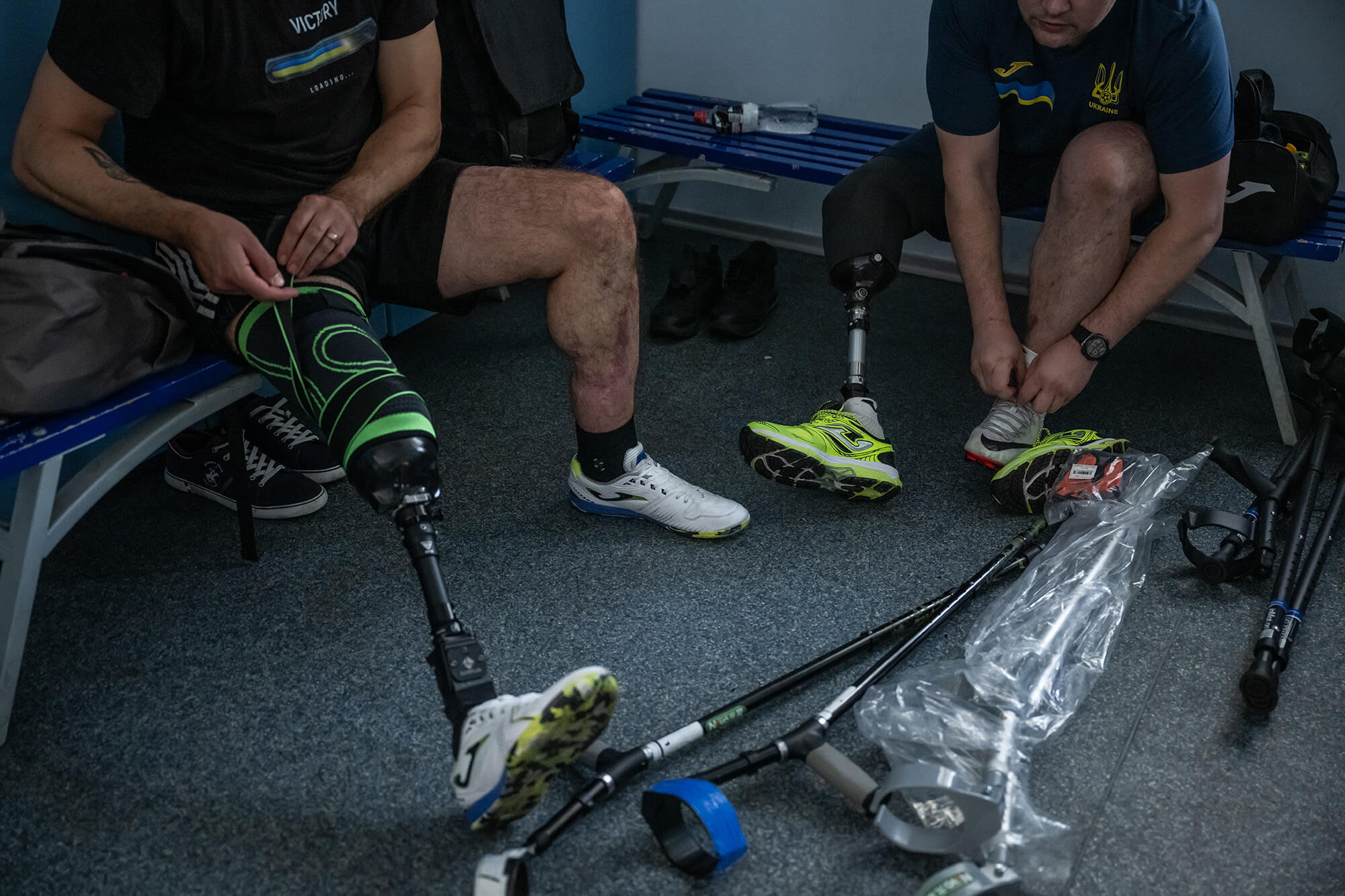
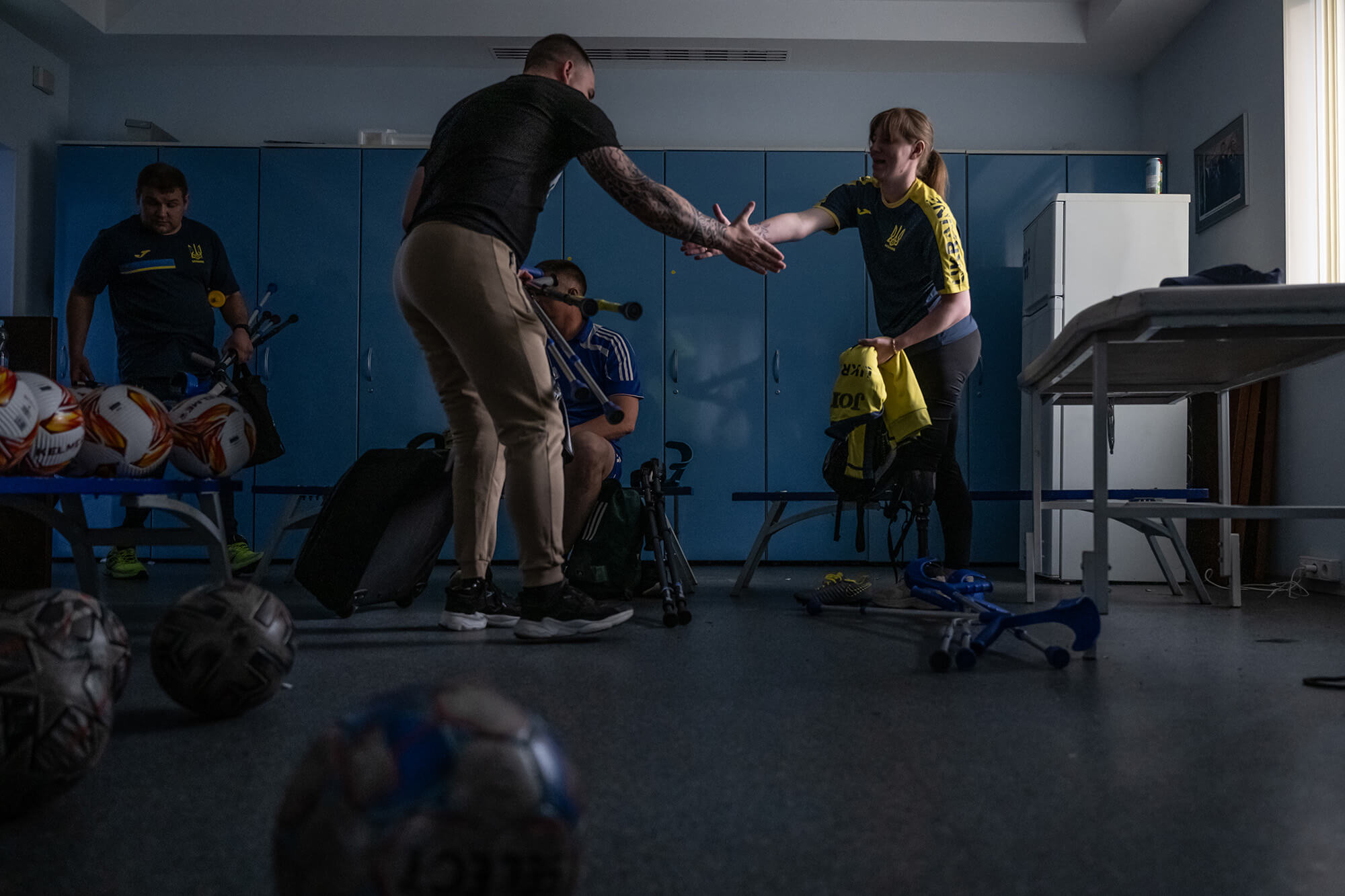
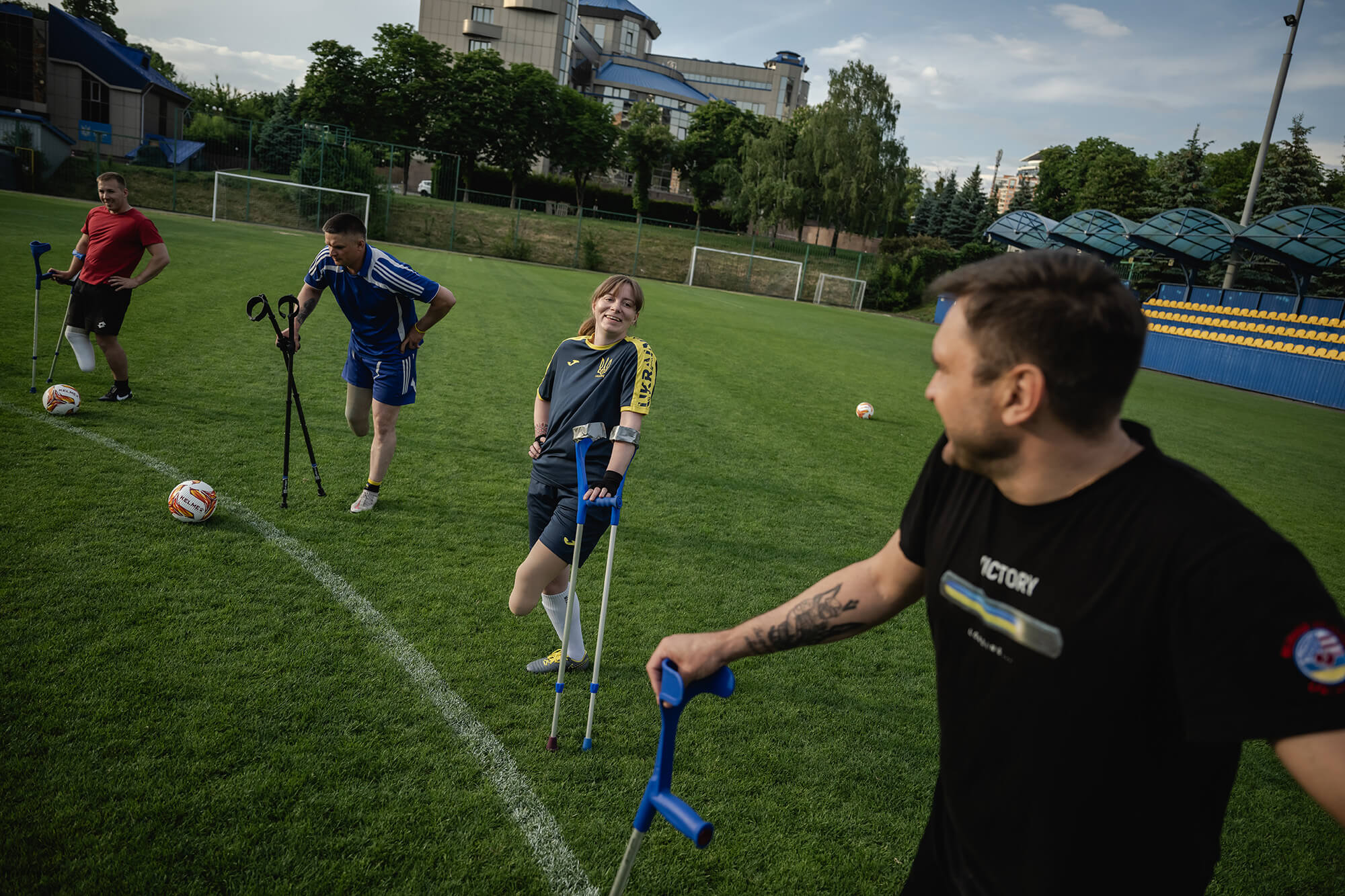
There, near Avdiyivka, when Olia fell on the ground, her left leg went up and she didn’t manage to lower it. The loud bang turned into silence, and a moment later, Olha was thrown out of sleep again.
“What hurts?” asks the comrade, whose neck Olha clung to tightly.
“My leg,” she said, and then fainted. .
She comes around when a tourniquet is applied to her. She is afraid to move so as not to make it worse. Raising her head, she sees her two feet.
“What is there?”
“Everything is fine,” the guys answer, but they hide their eyes. The foot is indeed there, but it is barely holding on. Olia faints again, and while she is being evacuated to Avdiivka by car, several more shells fall nearby. The one near the car didn’t explode.
In Avdiyivka, Olia was put on the operating table. Before the anesthesia took effect, she heard fragments of conversations—“almost fragments,” “the knee is intact,” “there is nothing here,” “look again, nothing more.” Perhaps through the anesthesia or because of it, Olia felt how she was being turned over, and then the sound came like the zipping of a bag. “They were wrong,” she thought in the blackness of her dream. They had put her in a black bag, and she was still alive and had to move somehow for them to understand.
She opened her eyes at the hospital in Pokrovsk. It was dark in the room; a tube was in her throat. Nearby, a woman, a nurse, is putting small beads on a thread – she is embroidering. Olia feels that her leg is numb. When they put her on the stretcher, she saw that her left foot was lying over her right one, and it seemed as if it was still lying like that.
“Excuse me! Could you please fix my left leg?” she said to the woman. The nurse put down the embroidery, got up, and lifted the blanket.
“But you don’t have it.”
She is twenty-four years old. Olia started screaming.
A harmless prosthesis
“Why isn’t he screaming?” it was the first thing Olia asked tiredly, when the little baby was placed on her chest.
“Where are you hurrying? The umbilical cord hasn’t even been cut yet. He’ll manage,” the nurse reassured her.
Olha wore a prosthesis during her second pregnancy. She was very afraid, but not because of the prosthesis. There is nothing scary about a prosthesis at all, except to drive a car with a manual transmission and even that only in the capital. Olia didn’t think about the prosthesis at all, she felt it as a part of her body. She says, “My name is Olha, and my iron leg is Serhiivna. Together we are Olha Serhiivna.”
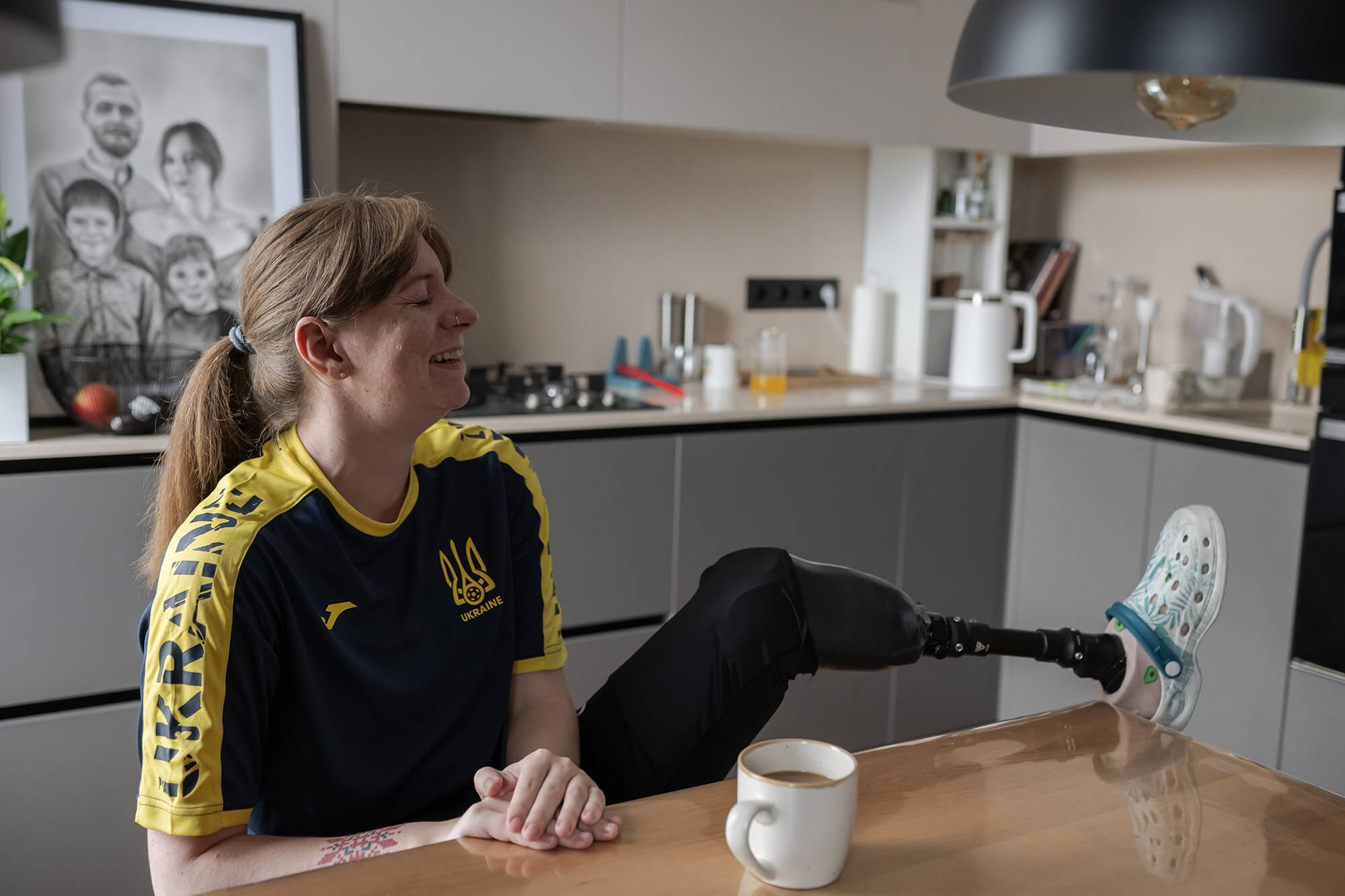
It was scary to give birth for a second time because I already knew how painful it would be. When she was giving birth to her first son at 22, she hadn’t heard much about childbirth, except maybe from her mother. So, she lay calmly on the bed and waited. The doctor asked to inflate the stomach. Olha thought it was to ease the pain, because the pain was unbearable. But the pain didn’t go away.
“I can’t, it hurts too much,” she says, then raises her head and adds a bit surprisingly, “Excuse me. Am I giving birth?”
“Have you just figured that out?”
No one asked anything about the prosthesis. Olia imagined it like that: when she came to the hall, she would take her prosthesis off so as not to rub it, lie down calmly, and get ready.
Although everything was, of course, not exactly like that, it happened so quickly that as soon as she was put on the bed, the nurse asked,“What should I do with the leg?”
“Put it away somewhere, because I’m just giving birth!”
Everything was like everyone else’s experience, only once the nurse asked if Olia could put on pants when she left the ward—so that no one could see the prosthesis.
“And why?”
“Well, so as not to scare the other moms…”
“Why would that scare anyone? There is a war in the country. I walk the way I feel comfortable.”
When the baby was placed on Olia’s chest, and she was afraid because the baby wasn’t screaming, she heard her husband from the corner of the delivery room. It seemed to her that he was crying.
We’ll go slower
Oleksii, her future husband, arrived at the hospital immediately. He was also a military man; they met when Olia brought food to his position.
She opened her eyes, and he had already been sitting by the bed. It was the most difficult moment for her “What will Oleksii say?”
“I am twenty-four years old, and I don’t have a leg.”
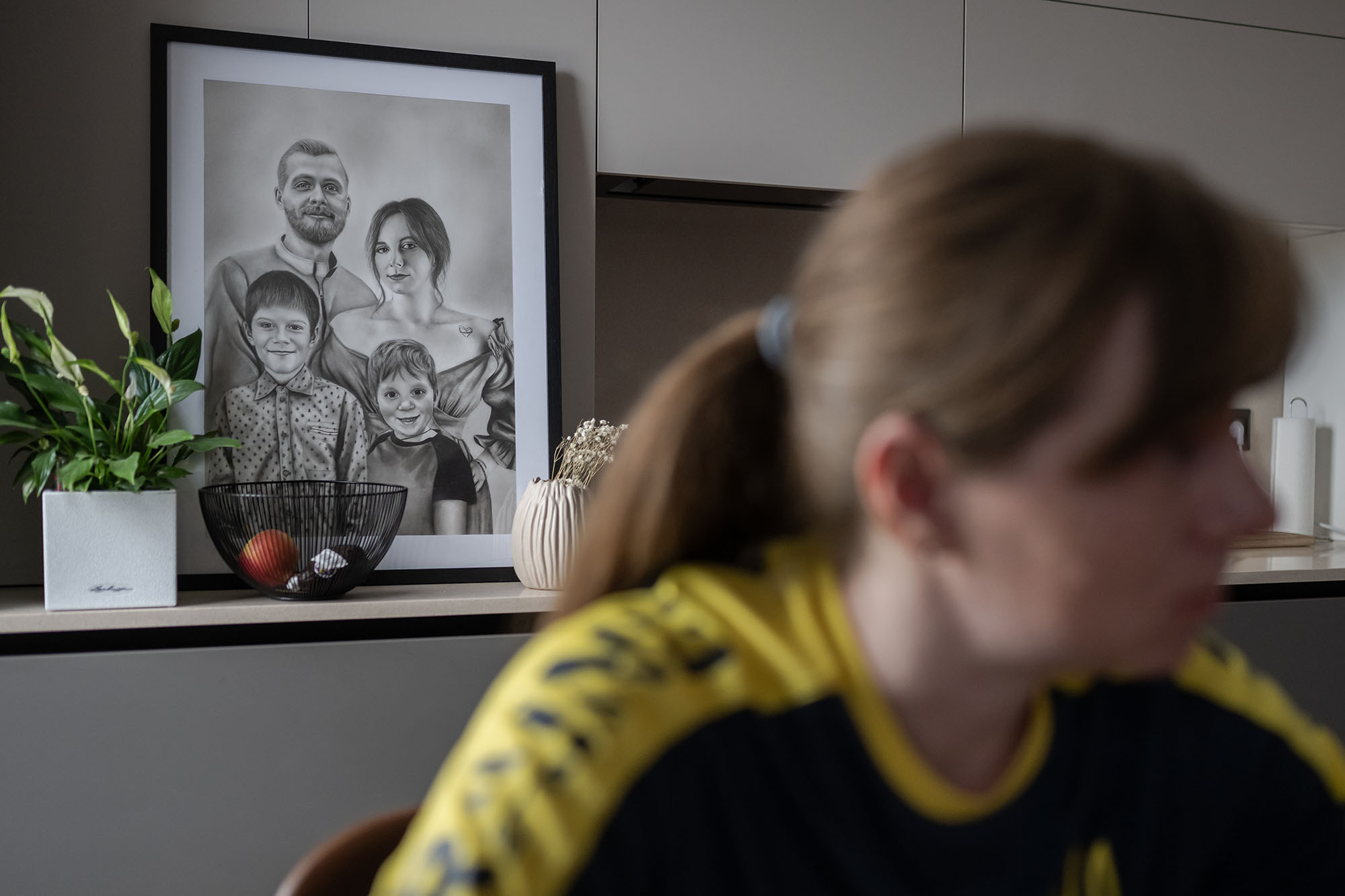
Oleksii stayed by her side all day long, dressing her, feeding her and reading fairy tales to her. It was he who immediately reassured her that nothing had changed, she would be given a nice prosthesis and everything would be as usual, except that their walks would become slower and they wouldn’t run as fast.
At that moment, the fear passed, and Olia began to look forward to rehabilitation as soon as possible. She wanted to learn how to balance on one leg, stand up, sit down, get to the kitchen, bathroom, toilet and do everything else.
The same mom
Once Olia had received her first training prosthesis in July, she immediately asked the doctor for permission to leave the hospital for Vinnytsia. Her son Dmytro had been living there with her mother for a year and a half,having stayed with his grandmother when Olia went to the war. Dmytro was about to turn three, and Olia promised that she would be there for all his birthdays.
It was going to be the first time she saw her son after the injury. Her mom had offered to bring him to the hospital even earlier, but Olia didn’t want him to see her tired or unable to do something. She didn’t want him to take her hand and say, “Let’s run, mom!”, when she wouldn’t be able to get up, or be able to run.
When Olia finally hugged Dmytro, he was only interested in his mother, and didn’t even notice the changes. At the age of three, he might not have remembered what it had been like before. Her younger son Marko also doesn’t see anything unusual. Wherever he wants, he pulls her along saying,“Let’s run, mom!”
Dmytro is 10 now. He goes to school, hugs his mother and runs out the door. Olha thinks that when the older Dmytro remembers that she left him at his grandmother’s and went off to war, even if he is angry inside, he will understand it later. She did it for him. In 2016, at the age of 22, Olia wanted to make sure that her son wouldn’t have to see the war.
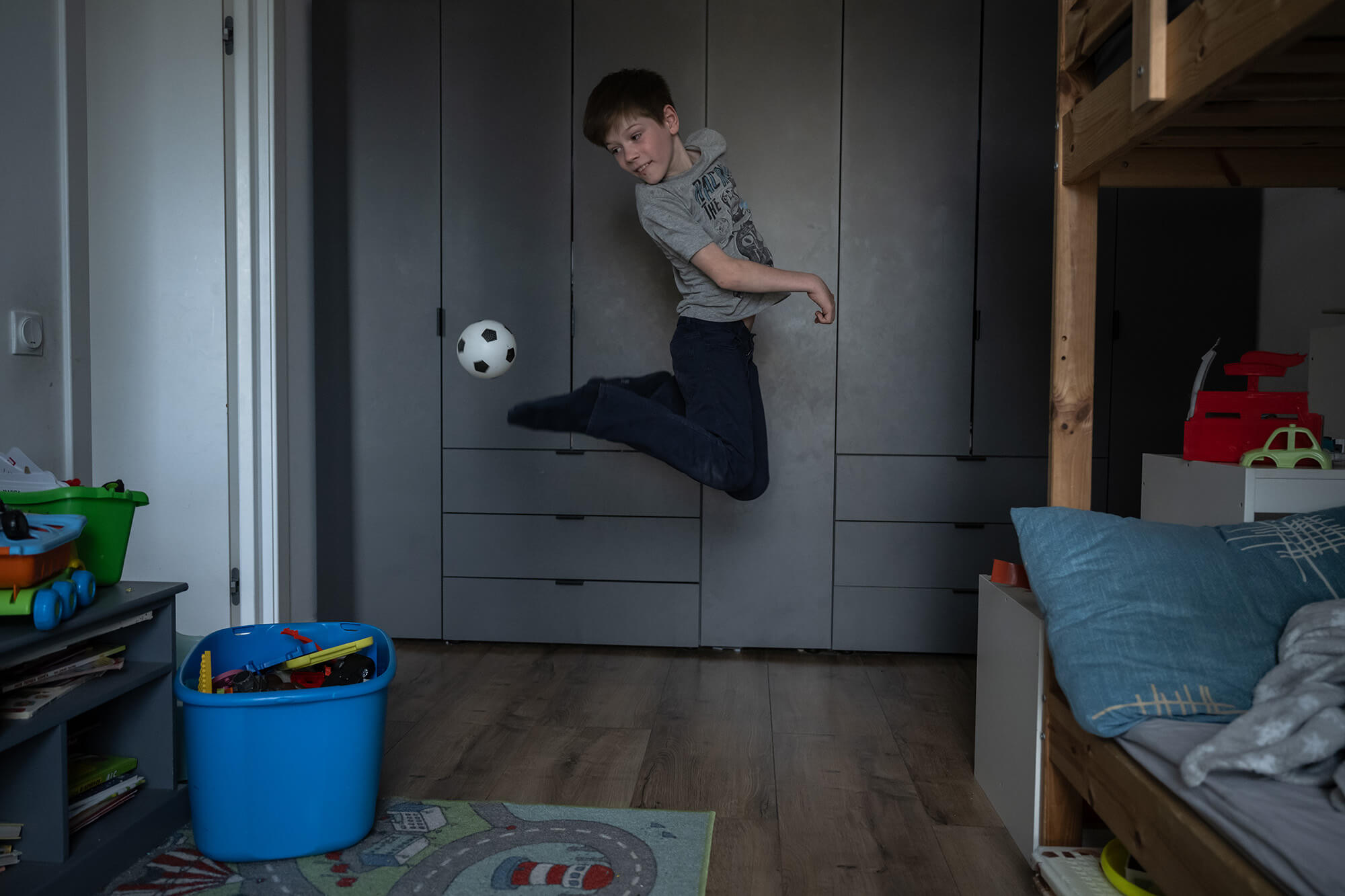
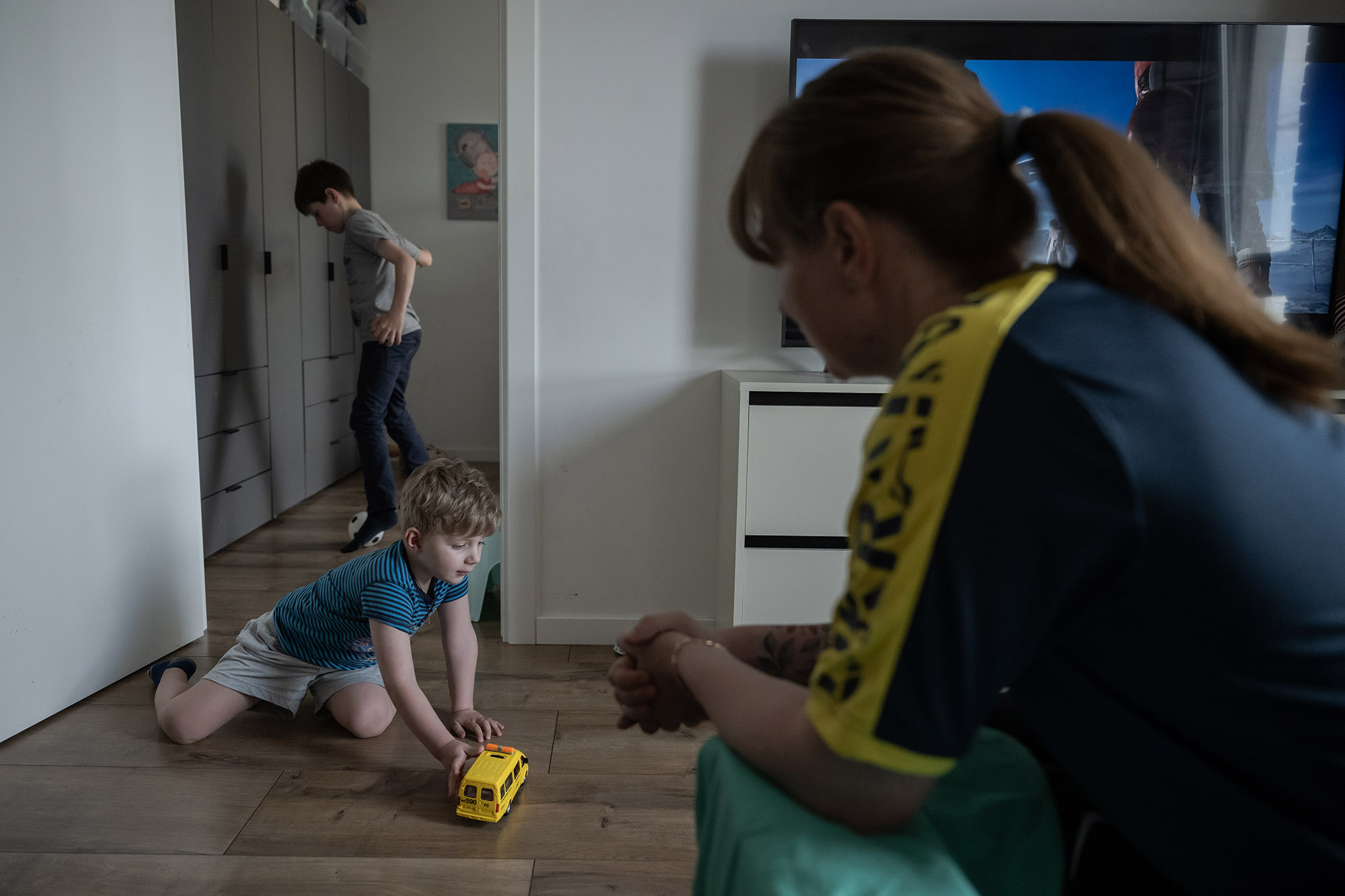
She joined the army to contribute to the struggle. Not knowing how to win it strategically, she did what she thought was necessary. Sure, it was more preferable not to take her, a young woman, but she persisted and signed a contract with the 72nd Separate Mechanized Brigade “Chorni Zaporozhtsi”, where she became a senior cook in one of the battalions.
At first, she cooked for commanders in the relative rear,not because she was afraid, but because she was ordered to do so. But when she was asked if she could go and cook at the frontline positions, she agreed and left immediately. It was possible to go on rotation, to go to the rear, then to the positions again, but she didn’t want to change units constantly, so she could get to know people and find out what they liked and didn’t like, what they can and can’t eat. So, she stayed in positions with “her guys.”Dmytro is already proud of his mother. They have recently gone together to shoot a social project at the Ministry of Veterans Affairs of Ukraine, and Olha was asked to wear a uniform for a photo. On her way to Kyiv, the woman took a picture with her two sons in the elevator.In the picture, you can see the older Dmytro is looking at Olia in the mirror with childish delight.
Run and fight
After maternity leave, Olha returned to sports. When Marko was almost three years old, she was offered to try amps football,which is football on crutches. In Ukraine, the women’s national team is just beginning to form while the men’s national team has already existed successfully for a long time. Olia and her friend Tanya are among those currently creating this women’s team. They started working in the Ukrainian Football Association, where Olha is a manager of social project development. They are still lacking girls, so sometimes Olia enters the word “prosthesis” in the Facebook search line, looks for girls and just writes, “Join the football team.” One girl answered that she had a high leg amputation, so she wouldn’t be able to hit the ball. However, in ampfootball, one leg is enough since the players run on crutches. In September 2023, Olha came to Zolotonosha to the Maximum Camp where she and nine other girls began to learn to play on crutches. Among all the women, Olha is the only veteran.
“I don’t walk on crutches at all, but here I did it, my hands hurt, everything hurts. We have learned to walk on crutches, then run on crutches, then kick a ball. We rocked for some reason for a long time, maybe because we were trained by a person with two healthy legs, even if he bent one. It was funny; we understood how to kick, but we didn’t know where to kick, because somehow we had forgotten to learn the rules of football. But it was nothing. Then I saw the training of the Polish women’s team and realized how powerful it could be, how beautiful it could be. At the same time, when you take your prosthesis off and stand on crutches to play, your legs rest much more. Although my hands hurt,” she laughs.
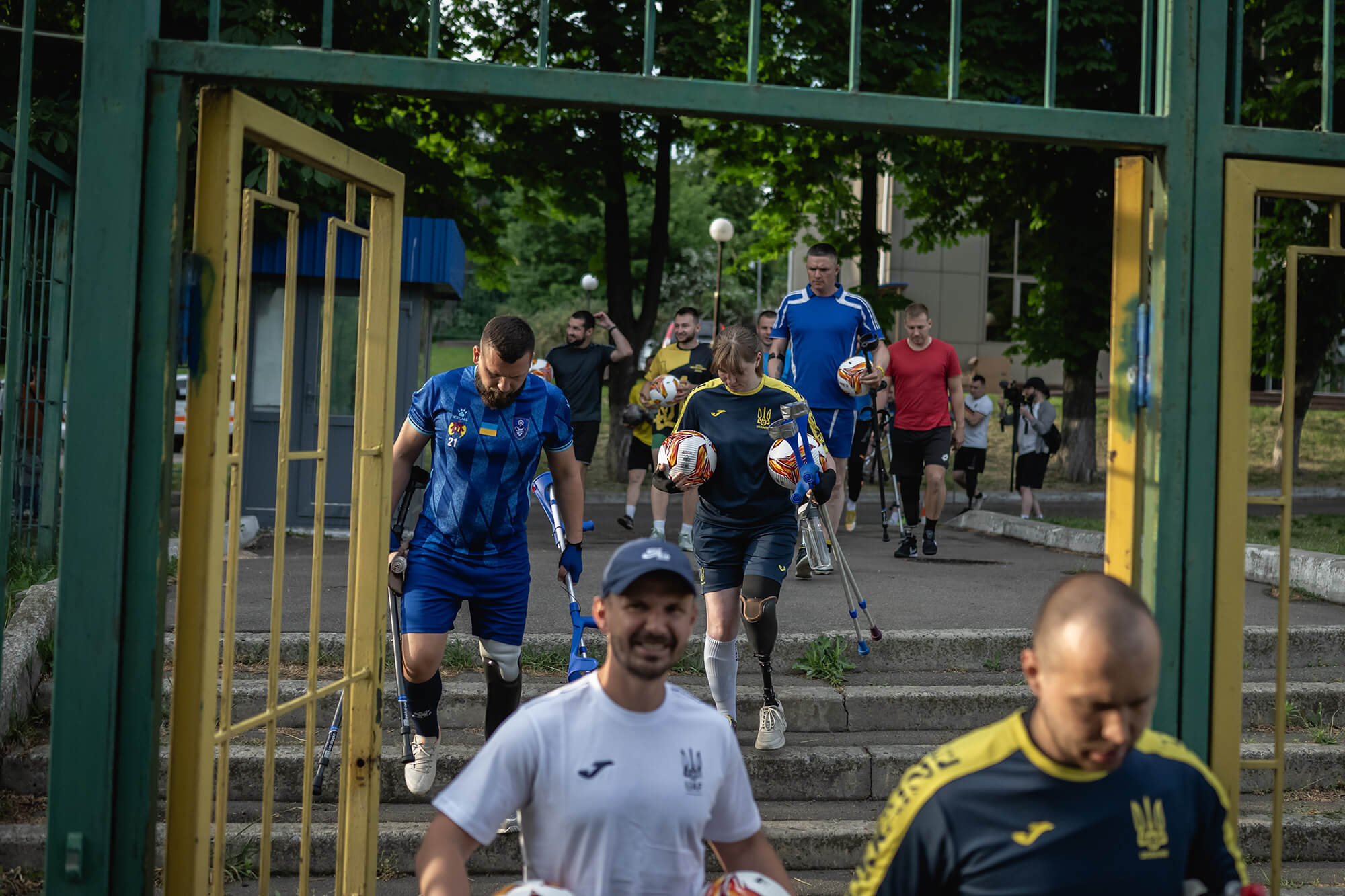
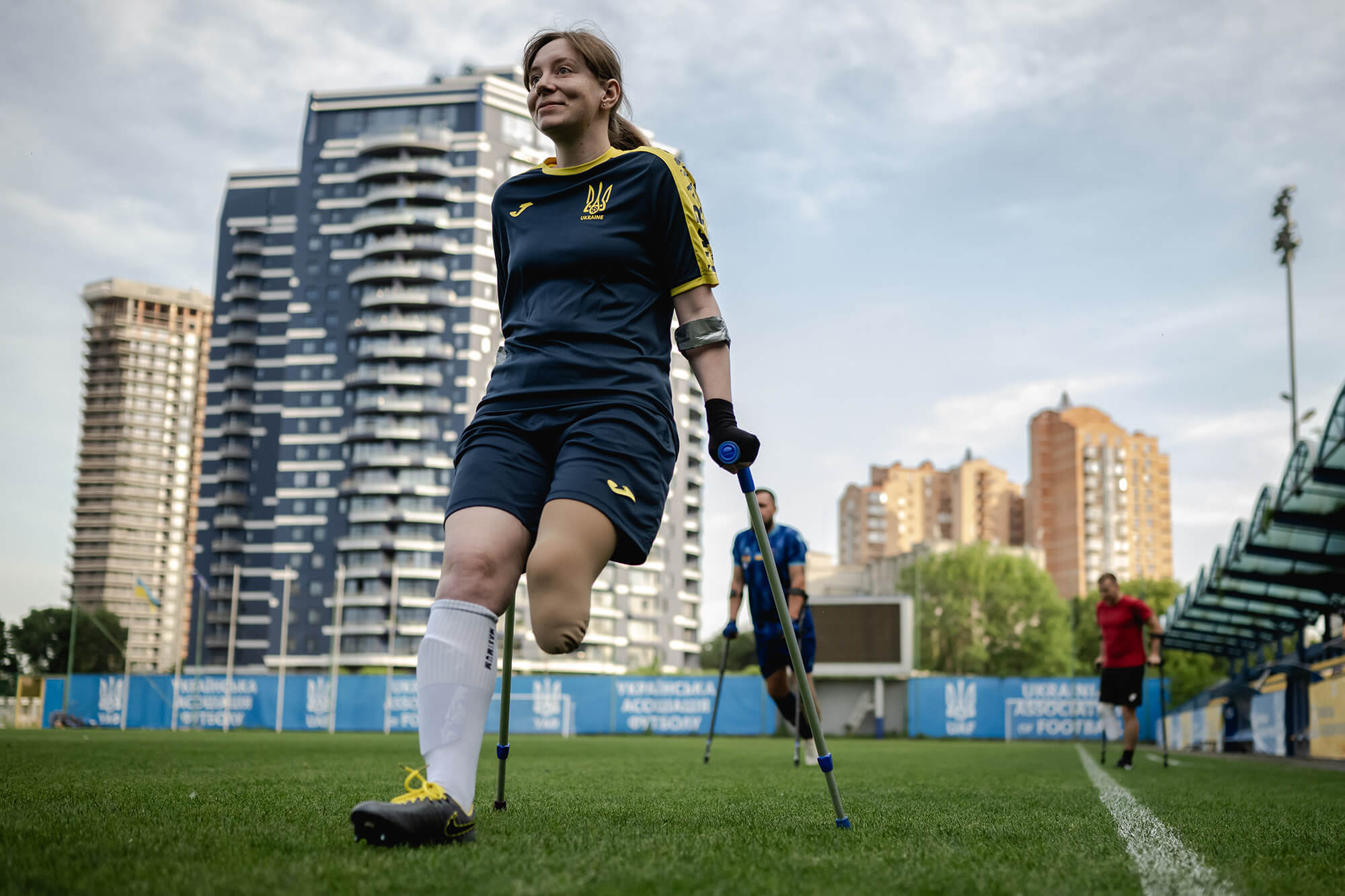
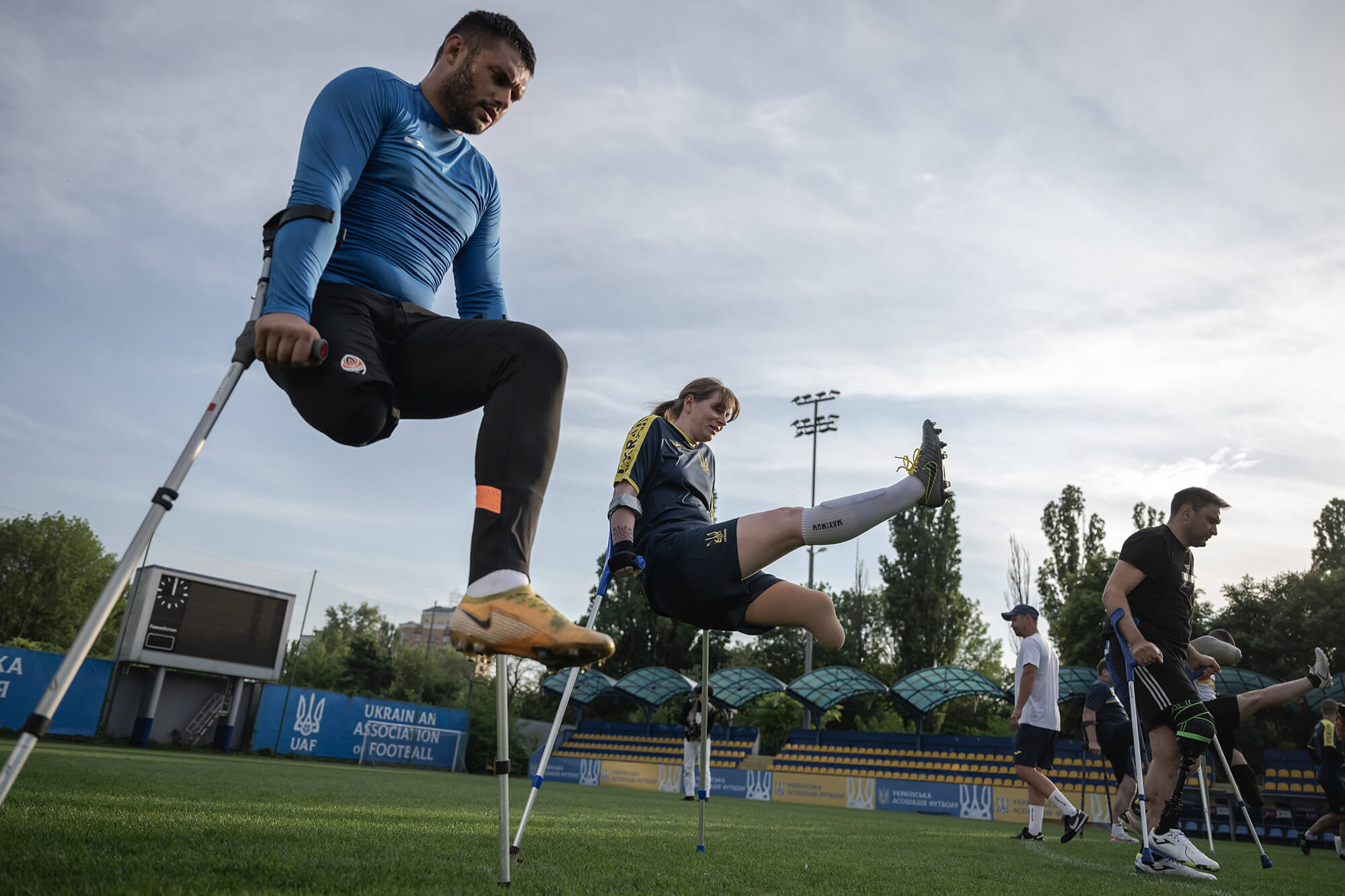
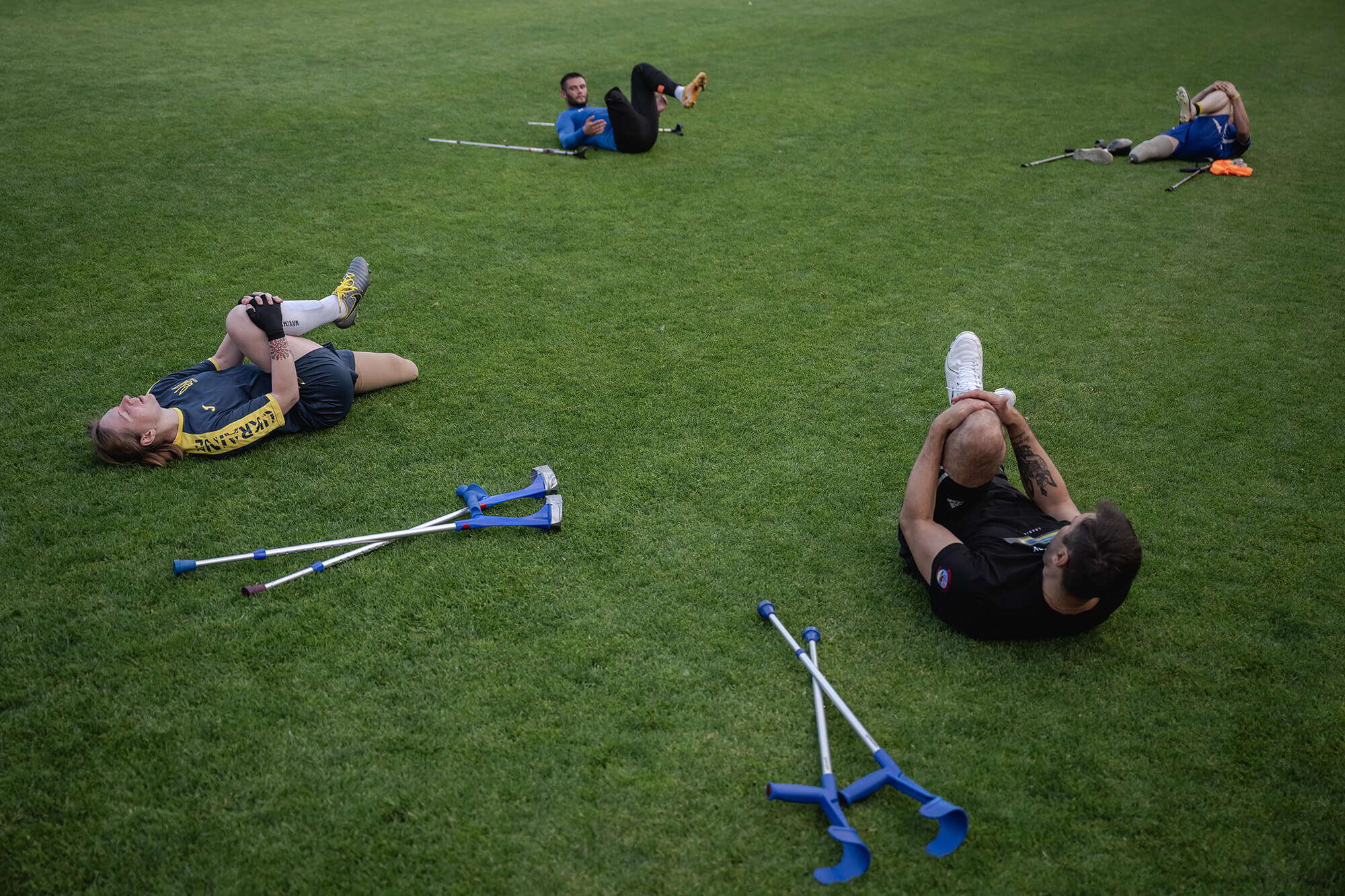
Currently, every Thursday, Olha and her friend Tanya from Vinnytsia go to training. Now, they are practicing with the men’s national team.
Sometimes it’s scary how they hit the ball. But we are training with strong people, and it doesn’t allow us to relax. I want to talk about this football more so that more women will find out about it, and we will create a super team.
Olha is an active woman and a slightly tired mother. Her older son, ten-year-old Dmytro, runs up the stairs first, outraged that he wouldn’t be taken to his mother’s football practice today because he had misbehaved. Asking for forgiveness isn’t an option for him yet; he knows they won’t believe him. The youngest, three years old Marko, is a bit sleepy and grumpy because he just woke up and doesn’t want to change his T-shirt. He wants to go neither to training nor to his grandmother’s, but knocks with his little fist on the neighbor’s door. Even the elevator doesn’t work, and he reaches for his mother’s arms. The mother drops the handles of the bags on her elbows, puts the crutches under her arms and takes the little one. If you saw Olia for the first time, you would want to rush to help her.
In the yard she is packing her children’s backpacks, a cake and sushi for her mother-in-law, who will stay with the children, her backpack and the crutches on which she doesn’t walk but runs, into the trunk of her small car. She presses the gas and accelerates on the avenue already at the entrance to Kyiv, and I quickly lose sight of her small hatchback Ravon R2 with a sticker of the robot from “Star Wars” R2-D2.
Before going out onto the field, Olia takes her prosthesis off, stands on her crutches and starts running, and the boys do the same. The ball is in the field, and Olia, as an attacker, is waiting for her time near the goal. Some members of the team, who are also in training, don’t have amputations. Olha jokes that they have “a complete set.
The team breaks up when it’s getting dark. Olha is satisfied with today’s training. She is without Tanya, who is on a business trip in Sumy Oblast. That evening, Olia scored a goal in a flash. She packs her crutches, and the blue R2-D2 quickly disappears around the corner.
Mom can do everything
Her friend Tanya has been missing a leg since birth. The first thing she noticed is that Olia always stands on the scale with a prosthesis, while others take theirs off. Olia can’t take it off because, for her, the prosthesis is a part of her; together, they are Olha Serhyiivna. The second thing Tanya noticed is when a person has just one leg and one prosthesis, Olha always refers to them as two legs. While washing the floor, Olha asked Tanya to raise her legs.
“Good joke,” laughed her friend. But Olia was not joking: if there are two legs, then there are two of them. Tanya also noticed the difference between Olia’s children and her own niece; that’s an important point.
The niece sits only on one of Tanya’s legs, as if she is avoiding the prosthesis, and not wanting to make an extra movement. In contrast, Marko sits on both of his mother’s legs.
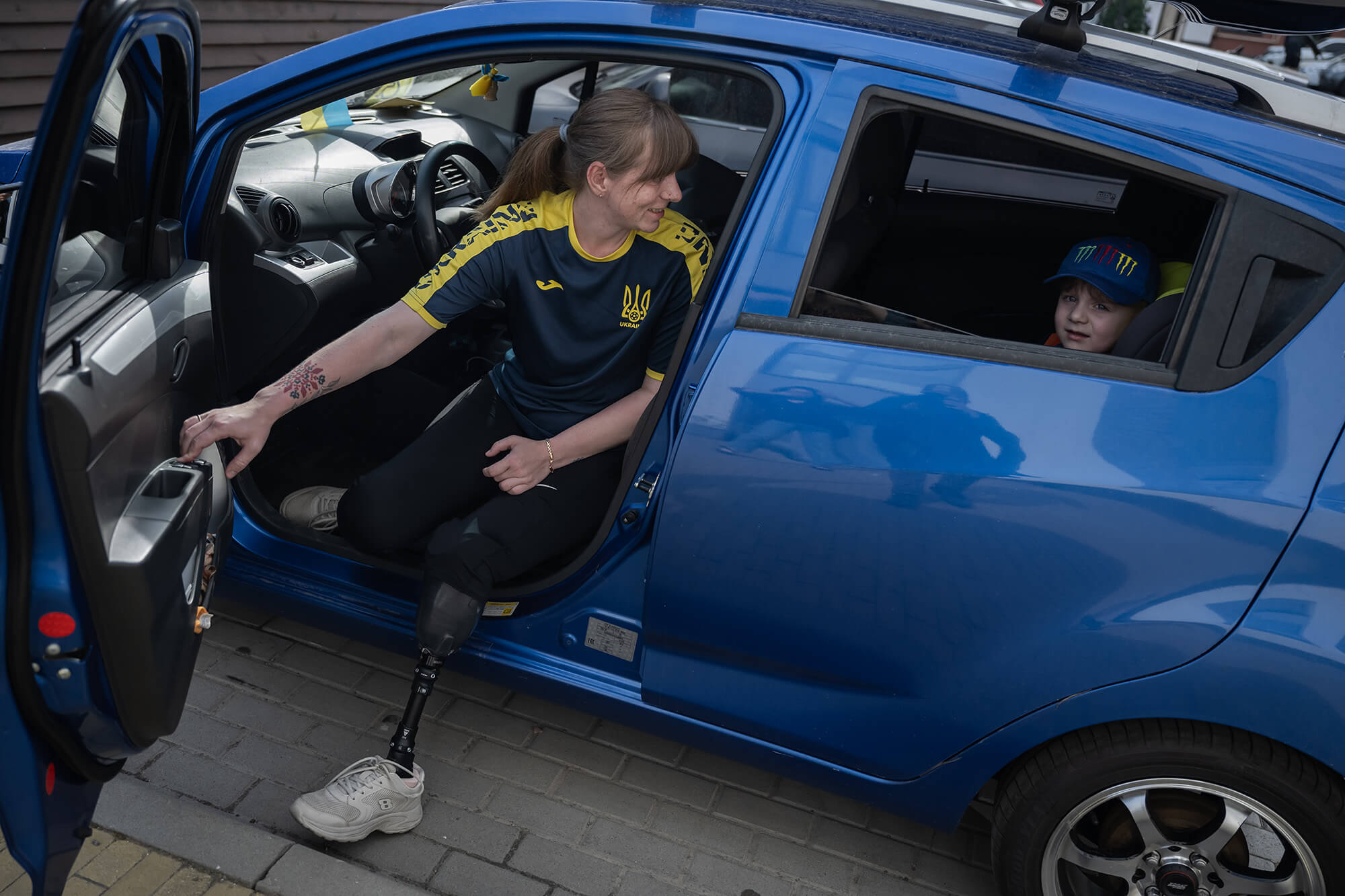
When Olha went to the camp to train to play ampfootball for the first time, Marko was two and a half years old, and still didn’t want to be without his mother. So, she asked if she could take her two sons and mother-in-law with her. The little ones fell asleep next to their mother, saw her at the stadium and watched her at the training sessions. When they first leave the house, they say,“Mom, let’s run!”
Neither Dmytro nor Marko knows if there is anything their mom can’t do. Well, Dmytro is only a bit upset that his mother can’t take him to the stadium today. Otherwise, they believe their mom can do anything.
Once, a neighbor told Dmytro to help his mother because it’s hard for her with her leg. Dmytro was surprised and asked, “What’s wrong with her leg?”
“The Power to Continue” is a collaborative project between the United Nations Development Programme in Ukraine and Reporters. Our goal is to share unique stories of veterans and civilians who have lost limbs in Russia’s war against Ukraine, and not only found the strength to survive the trauma but also became drivers behind social projects and bold business ideas. We also highlight the stories of people who have helped them along the way. While there are not many of them, these people inspire and speak openly about their experiences, and this might become a starting point for others.
The special project was initiated by Reporters with the assistance of UNDP in Ukraine and financial support from the European Union as part of the “EU4Recovery—Empowering Communities in Ukraine” project. The opinions, recommendations, assessments, and conclusions expressed in these materials do not necessarily reflect the official position of UNDP, the EU, or their partners.
Have read to the end! What's next?
Next is a small request.
Building media in Ukraine is not an easy task. It requires special experience, knowledge and special resources. Literary reportage is also one of the most expensive genres of journalism. That's why we need your support.
We have no investors or "friendly politicians" - we’ve always been independent. The only dependence we would like to have is dependence on educated and caring readers. We invite you to support us on Patreon, so we could create more valuable things with your help.
Reports130
More


